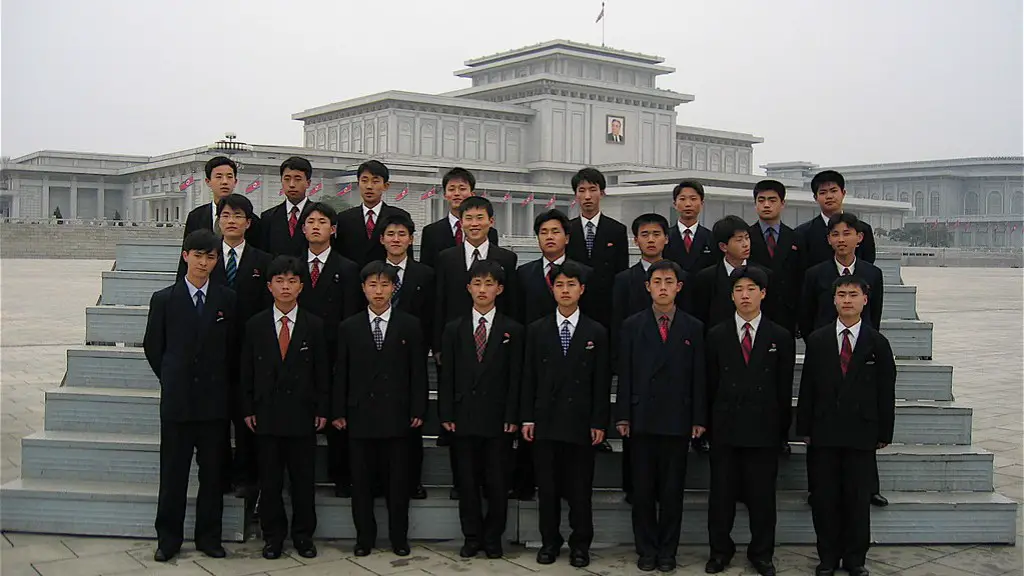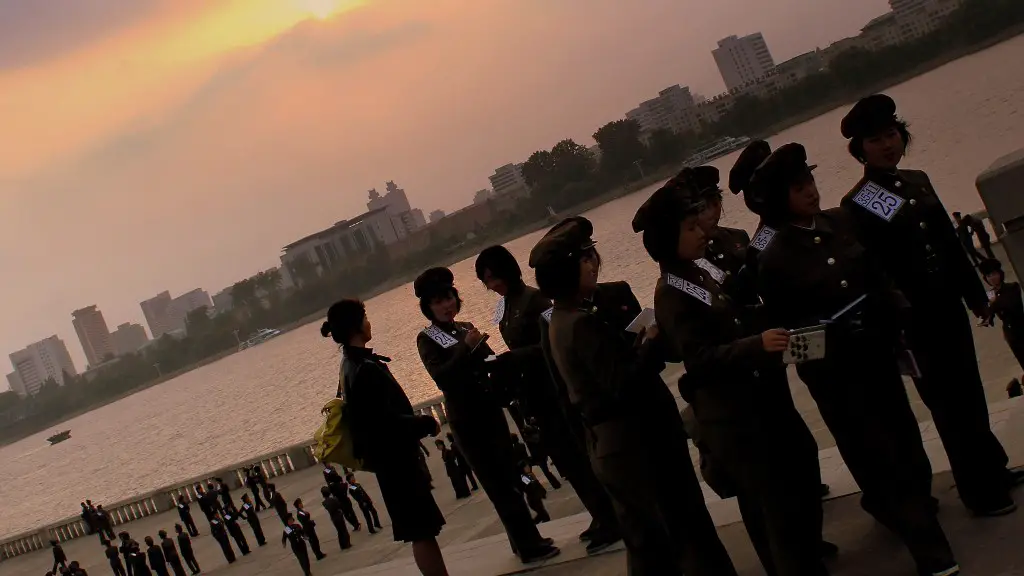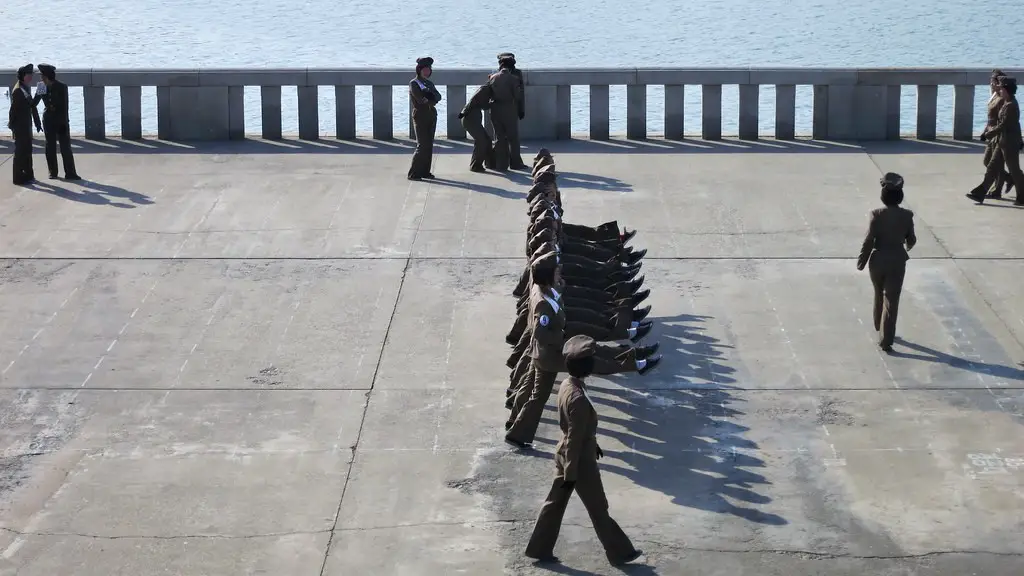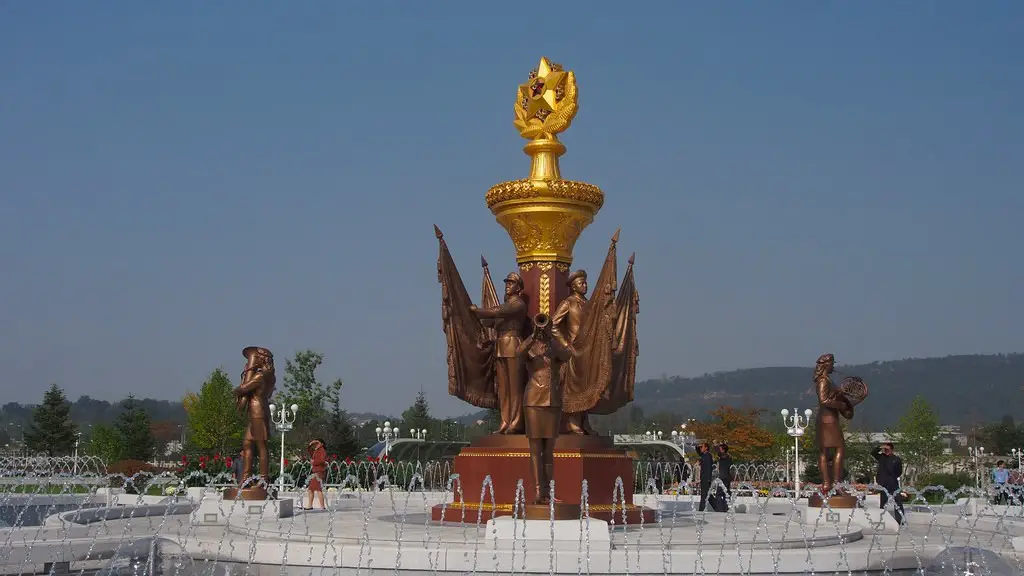Overview of North Korean Political System
North Korea is a nation in East Asia that was created out of the Korean peninsula partitioned in 1945 following the World War II. The country has been described by various analysts as a dictatorship or one-party socialist state. It is officially known as the Democratic People’s Republic of Korea (DPRK), led by the supreme leader Kim Jong-un as head of the ruling Workers’ Party of Korea (WPK). North Korea is not affiliated to any international organizations, independent of any foreign governments, has a strong army and is often referred to by outsiders as an Orwellian state.
Political power in North Korea is structured in a de jure single-party system consisting of the WPK, currently led by the Kim family, with over three million members. In order to gain more control over the populace and control the flow of information, the country has maintained a tight grip over the media, internet and telecommunications. all citizens are required to be members of the WPK and all senior posts in the DPRK are filled with political appointees, although citizens are free to vote and elect candidates. The Supreme People’s Assembly, the nation’s reputed national legislature, is almost entirely composed of WPK members chosen from pre-approved candidates by secret ballot.
Since its establishment, the power of the Kim family has added a dynastic element to North Korean politics. Kim Il-sung, the first leader of North Korea, in effect controlled the nation for half a century having set in place his government’s totalitarian rule. His son and grandson have since taken over the reins. North Korea’s political power is highly centralized and the system remains inhospitable to any form of dissension. It is also socially stratified, with the Kim family’s circle of influence ostensibly cast in stone.
Politically speaking, North Korea has seen a few attempted reforms. In 2002, it implemented a new constitution that purported to transform the government into a people-centred responsible democracy “without fight and favouritism”. The reforms have had little to no effect and North Korea remains one of the most repressive and closed countries in the world.
Analysis of North Korean Political System
The effects of a political system that allows only one party takes a toll on citizens of the nation as it limits freedom of expression, civil rights and basic political participation associated with a democratic process. Lack of access to foreign media contributes to the lack of information, with ordinary citizens relying solely on state-managed media, thus allowing authorities to control freedom of thought as well as information dissemination. North Korea remains one of the few authoritarian countries that allows only one party to rule.
Regional and international organizations have long decried the North Korean government’s human rights record, citing their disregard for international laws and the country’s practice of enslaving its citizens to create an oppressive environment. In the face of frequent criticism from the international community, North Korea has shown no signs of changing its political structure.
According to experts, the North Korean political system is primarily based on the ideology of self-reliance, which denies citizens any political freedom or external assistance. This also means that North Korea’s economic structure is very isolated and centralized. A single government-controlled central bank acts as the country’s financial engine, a system which has caused widespread poverty and leads to a reliance of its citizens on state-planned and regulated subsidies.
It could be argued that the North Korean political system is a survival tactic as, despite its human rights violations, the country has seen impressive economic growth over the last decade. This has been achieved through a policy of autarky, enabling the nation to survive without external trade or investments. Additionally, the North Korean political system has proven resilient in the wake of international pressure, with Kim Jong-un and his predecessors continuing to face little resistance from their people.
Impact of North Korean Political System
The North Korean political system has had a major impact on the people of the country. The government, unlike many in the world, does not provide basic support for citizens and does not recognize economic, social or cultural rights. Human rights violations range from torture, arbitrary detention and sexual violence to the lack of access to health care, food and education.
In terms of economic development, North Korea’s autarky policy has led to an underdeveloped, inefficient and struggling economy. The state-run economy has few functioning private businesses and the standard of living of its citizens is significantly lower than neighbours South Korea and China. There is little foreign investment and a lack of technology, meaning the country has little access to the world markets.
The restrictive, authoritarian nature of the North Korean system also means that it has not been a productive participant in international relations. The country has often resorted to hostile tactics when dealing with issues, due in part to its hunger for self-efficacy. As a result, North Korea has faced both international and regional isolation, reducing its ability to benefit from international integration.
International Relations of North Korea
North Korea’s relations with the international community have been a source of great concern for many years. The government has been reluctant to engage in international dialogue, instead relying on rhetoric and military actions to express displeasure or plead its case. It has even occasionally lashed out against neighboring countries, particularly South Korea, which it considers enemies. This hostile attitude towards its neighbors has limited North Korea’s access to foreign aid and investment.
In recent years, the North Korean government has reached out to other countries in an apparent effort to break out of its self-imposed isolation. These attempts have met with a mixed response, with some countries, such as Russia and China, opening their doors a bit wider, while others are hesitantly welcoming North Korea’s potential for change. South Korea, in particular, has softened its stance on North Korea and engaged in a series of dialogue and exchanges.
One of the main goals of North Korea’s international diplomacy is to secure economic aid as the country continues to suffer from extreme poverty. While the international community has offered economic assistance, North Korea’s nuclear program has been a major impediment in this regard. Despite this, the government has begun to look outward in hopes of further developing its already beleaguered economy.
Evaluation of North Korean Political System
In the present day, it is widely accepted that the North Korean political system is highly oppressive and outdated. Its autarkic policies and human rights violations have stifled economic development and kept citizens impoverished and oppressed. International relations remain strained and its government’s belligerent attitude has only served to deepen the nation’s isolation.
That said, North Korea’s political system is far from static and the country’s leader, Kim Jong-un, has overseen some attempts to introduce reforms. These have had subtle effects, but they may be the very first steps in a long road towards liberalization and moderation.
At the end of the day, it is difficult to predict what the future holds for North Korea’s political system. The nation has been isolated for years, and it is unclear how open it is to outside pressure and opinions. The international community must remain open to dialogue and cautiously handle the situation.
The Development of a North Korean Democracy
Many believe that a North Korean democracy is impossible not just because of the oppressive nature of its system of government, but also because of the lack of resources and infrastructure necessary to facilitate such a transformation. After all, a functioning democracy requires a literate and informed population, a vibrant civil society, strong institutions and the protection of human rights—none of which is available in North Korea.
Some have argued that a democratic transition for North Korea would require external intervention or support to be successful. However, such a move is not politically palatable for governments in the region and beyond, who view freedom of expression and other human rights as a disruptor to the international order. As such, a top-down, externally imposed regime change is highly unlikely to be successful and may even be counter-productive.
Rather, change in North Korea must come from within, and the government is already making efforts to reform the political system. In 2018, the country held an unofficial “election” with nearly a million people casting ballots – though the results of the “elections” are vague – as well and the population is becoming increasingly aware of the outside world through interactions and technology.
Many experts argue that it is impossible to predict the type of government North Korea may have in the future and any speculation is open to much debate. Nevertheless, regime change is a tricky process and could result in negative consequences if mismanaged. As North Korea continues to open up and the population becomes more educated, it is possible that democracy could take root, but only time will tell.
The Effect of Sanctions on North Korean Politics
North Korea has long been subject to sanctions from the international community due to its nuclear weapons program and many other actions that are considered illegal according to international treaties and laws. These sanctions limit the flow of funds, resources and materials into North Korea, making it difficult for the country to function and develop.
Due to the severe impact of these sanctions, the North Korean government has been forced to adopt a policy of autarky, which is the practice of self-sufficiency in the face of a hostile external environment. This has resulted in an isolated and inefficient economy that is propped up by the government, making it further vulnerable to external threats and economic downturns.
The sanctions have also had an impact on North Korea’s foreign relations. The country is increasingly isolated from the international community, making it difficult to engage in trade or avail of investment opportunities. This has made it more difficult for the North Korean government to fund its nuclear program and maintain its hostile attitude towards neighboring countries.
Ultimately, the sanctions have had a detrimental effect on North Korean politics. They have weakened the economy and isolated the country from the rest of the world. This has hindered the government’s ability to pursue its goals, allowing the current regime to further consolidate power and crack down on opposition voices.
The Role of China in North Korean Politics
China has long been North Korea’s closest ally and a major source of economic and political support. It has provided North Korea with aid, technology and trade over the years, while also offering diplomatic support and protection from hostile countries. This relationship is deeply embedded in the North Korean political system, with Chinese leaders often referenced in speeches and state media.
This support from China has been crucial for maintaining the current North Korean political system. China’s willingness to provide resources and assistance has allowed the government to resist pressure from the international community, enabling it to remain in power over the years. Despite this, the two countries have recently seen a chill in their relationship, with China taking a more critical approach to North Korea’s actions.
China’s role in North Korean politics is likely to remain ambivalent moving forward. On the





